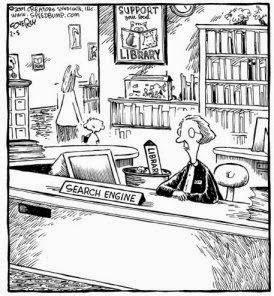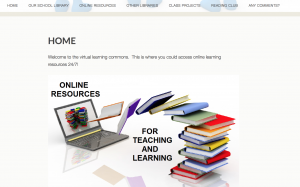“One common misconception is that in the future there will be less dependence on the physical library media center.” (Riedling, Shake & Houston, p.116)
Now as I came to the end of my study of theme one, I would agree with the above statement that it is a misconception that patrons will be less dependence on the physical library. However, at the beginning of theme one, it was my worry when I recovered the unnoticeably small, dusty section of reference materials (excluding the non-fiction section) in my school library. I questioned myself: why would I have such a worry? I have been doing inquiry project with my intermediate students in my music classes. As I could not find sufficient relevant print resources for the composers inquiry project I have assigned to my students, I have to guide my students in using online reference resources. As Riedling, Shake & Houston (2013) has stated,
“It is clear that students must have access to electronic information resources for their information needs … The number of print reference materials will certainly decrease in size, and as general reference moves online, specialized reference tools, such as Atlas of the Oceans, may moves onto the shelves.” (p. 118 – 119)
I have observed that my colleagues seem to be doing the same as I do: guiding students to online resources for information instead of the library. Hence, I asked myself: if I were the teacher-librarian, how could I advocate library resources over solely online resources? Maybe the following YouTube video that I discovered would shed a light on the issue:
I think the challenge of my school library is that the teacher-librarian is entitled to one and a half day at my school. That means, the library is “closed” for 70% of the school hours! Teachers would use the “closed” library for class inquiry projects. Students use the round tables in the library for group discussions, non-fiction books for inquiry projects, and the connected computer lab for online research. Unfortunately, the teacher-librarian is not in the picture due to the constraint of job entitlement. I wonder: Is there a way that the teacher-librarian could step into the picture? What could I do to collaborate or assist the classroom teachers and the students? The study of theme one has provided me with guidance and ideas on possible resolution to the matter.
Take Initiative to Get Involved
“You must be the one to reach out. Do not wait for teachers to come to you, and do not expect to succeed with your first suggestion. Keep the dialogue going. If one idea is ignored, wait a while and try another.” (Toor & Weisburg, 2007)
I think it is crucial for teacher-librarian to build a trustworthy relationship with colleagues and students before collaboration could happen. As teachers drop of their classes for library classes (primary grades) or book exchange (intermediate grades), or having lunch in the staff room, the teacher-librarian could start a conversation with the teachers. It is important to show respect to teachers and listen carefully to learn what the teachers are planning. The teacher-librarian could show the teachers what resources the library has, and could offer to introduce particular relevant information skills to the class.
Also, the teacher-librarian could reach out to students as they come into the library. Start a conversation and get to know more about the students’ learning would help in guiding them to the resources they need. A formal reference interview would be scary to elementary school students, however, a casual conversation could lead to an informal reference interview.
Most teachers are using the “Points of Inquiry” as a framework for the class inquiry projects, it is my goal that I could work collaboratively with teachers and students at all the points of inquiry as a teacher-librarian. It is my wish that if I were the teacher-librarian, colleagues and students would see my job title as the one shown in the cartoon below:
Photo courtesy of http://mediaspecialistsguide.blogspot.ca/p/media-specialists-and-teacher.html
Reference Resources
As I have quoted from Riedling, Shake & Houston (2013) earlier in this post, general reference moves online in this 21st-century learning. I think reference services should move online correspondingly. School library catalog could be accessed online 24/7, however, not many staffs and students use the online catalog during after school hours. In fact, I am not certain that staffs and students are aware of the availability of the school library online catalog at home access. However, according to the Surrey School District (No. 36) Teacher-librarian handbook, the library catalog is standardized by the district learning resources service. It is not customized to the need of a particular school community. If I were a teacher-librarian, I would like to try providing a customized reference services through creating a library blog for the school. I had created a “Virtual Learning Common” website as an assignment for a UBC teacher-librarian course that I took last year. It only contains my initial ideas of a library blog, and it is still under construction. Here is a screen shot of the home page of my site:
On my site, I have included a page for suggested free online resources for students, teachers, and parents; as well as a page for classes’ inquiry projects. My goal is to offer a 24/7 access online reference service to staffs and students through a user-friendly format, and at the same time, provide a platform for sharing learning achievements.
Final thoughts
Is it the fact, or a misconception that people will less dependent on the physical library for reference service? I think it is the fact that people would rely more on the electronic reference resources than the printed resources, however, people will continuously require the expertise of the teacher-librarian to provide reference service. If patrons do not come to the library for reference service, let’s reach out and hand out the service to them.
References:
Riedling, Ann Marlow, Loretta Shake, and Cynthia Houston. Reference Skills for the School Librarian: Tools and Tips. Third ed. Linworth, 2013. Print. An Imprint of ABC-CLIO, LLC
School District No. 36 (Surrey) Teacher-Librarian Handbook. Surrey School District, 2007. Print.
The Points of Inquiry: A Framework for Information Literacy and the 21st Century Learner. British Columbia Teacher-Librarians’ Association, 2011. Print.
Toor, Ruth, and Hilda K. Weisburg. New on the Job: A School Library Media Specialist’s Guide to Success. Chicago: American Library Association, 2007. Print.


